Freshfields unveiled a set of ambitious environmental goals in 2021, among which was the phase out of single-use plastics across all of its offices.
Making progress on plastics has not been easy, but catering has been a good place to start. Offices are required to report all single-use plastics procured for catering, hospitality and refreshment areas. Understanding the type and quantity of single-use plastics entering our offices is important for identifying opportunities for alternatives.
The success in reducing single-use plastics so far can be attributed to the efforts of our Global Green Group, who have sought alternatives to plastics, not just in catering operations, but across the firm's procurement spectrum. Importantly, our commitment extends beyond numbers to fostering a cultural shift in waste behaviours. London, for example, sends zero waste to landfill, supported by messaging about the value of reducing, reusing and recycling, as well as specific green office guidance.
Freshfields has championed Plastic Free July, a global initiative established in 2011 to encourage people to minimise their consumption of single-use plastics throughout the month of July. The firm's involvement has raised awareness about the environmental hazards posed by plastics and the importance of responsible waste management practices both within and outside the office.
Freshfields colleagues from Amsterdam to Hong Kong are helping to replace old patterns of behaviour with modern, green alternatives.
Amsterdam and the Plastic Whale: taking the lead on waste
Freshfields' Amsterdam office has partnered with a local charity, Plastic Whale Foundation to tackle plastic waste, and engage colleagues and the local community.
The Plastic Whale Foundation transforms plastic litter from the city's canals into practical items like foam boards, office furniture and even lamps. All remaining waste is separated into the correct waste streams and enters the recycling lifecycle. With around 50,000 PET (polyethylene terephthalate) bottles fished from Amsterdam’s canal network annually, as well as large amounts of other waste, the Plastic Whale Foundation’s efforts have a significant positive impact on the city. The project's fleet of fishing boats, constructed from fished plastic, symbolises a circular approach to waste management.
Freshfields fully embraced this initiative in 2023 by sponsoring a boat for the next three years, offering colleagues the chance to participate in canal clean-up events and collaborate with clients for a meaningful cause.
In addition, the Amsterdam office has installed a new selection of recycling bins, consisting of four separate waste streams for food, plastics, cans and residual waste. Each waste stream is tracked with the aim of encouraging the office to maintain its high level of waste management and, in turn, reduce waste from being unnecessarily incinerated (which itself releases carbon emissions).
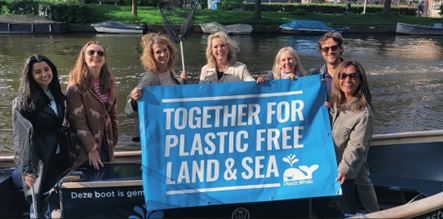
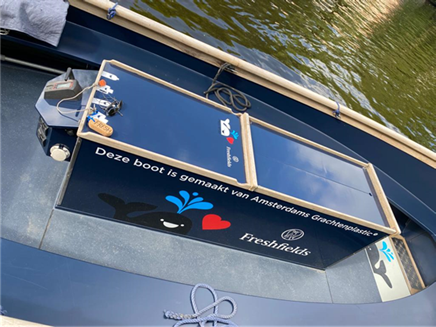
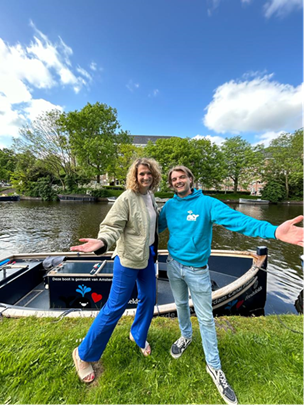
Hong Kong: the Spare-It challenge
In Hong Kong, Freshfields' commitment to sustainability has taken a tech-savvy twist. The Hong Kong office in 2023 embarked on the Spare-It Smart Waste Reduction Challenge, a corporate initiative that leverages technology to monitor and enhance waste diversion and recycling efforts.
As the number of general waste bins in the office has been reduced, an increased number of collection boxes for recyclables and compostable waste have been made available, making it easier than ever for colleagues to avoid landfill. This initiative not only reduces our environmental footprint but also sets an example for other occupants of the building taking part in the challenge, creating a positive competitive edge.
By shunning personal rubbish bins in favour of strategically placed points for recycling and compost collection, the office has embraced its competitive spirit and achieved an impressive 49 per cent diversion rate of waste from landfill. Efforts in reporting and reducing consumption of utilities in the office resulted in the team receiving a platinum award in the Green Performance Pledge, organised by Hong Kong office landlord Swire Properties.
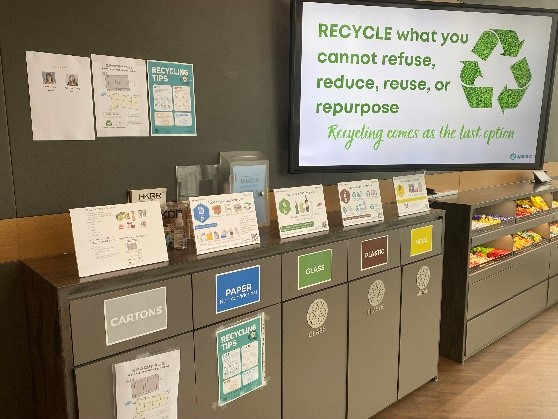
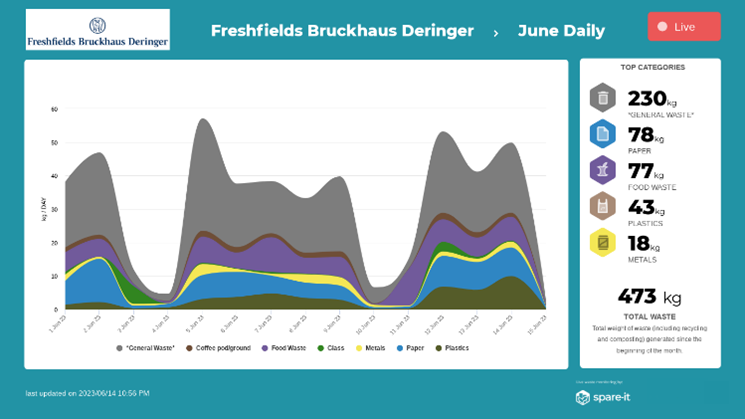
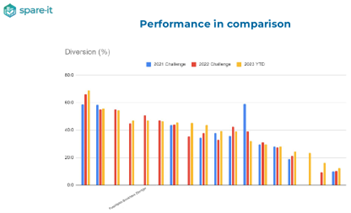
From Silicon Valley to Tokyo: a global effort
All three of our US offices (in Silicon Valley, Washington and New York) have said farewell to plastic cutlery in favour of personal portable cutlery, which has become a symbol of waste reduction.
Similarly, following our Tokyo office’s move to 100 per cent renewable energy in April 2023, a number of important changes have been introduced, from prioritising reusable cutlery to providing eco-bags and glass-bottled water. In Abu Dhabi, a simple yet effective shift from plastic to refillable glass bottles has significantly reduced plastic waste, while colleagues are empowered by monthly reports to drive waste reduction further.
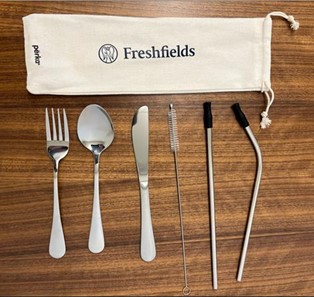
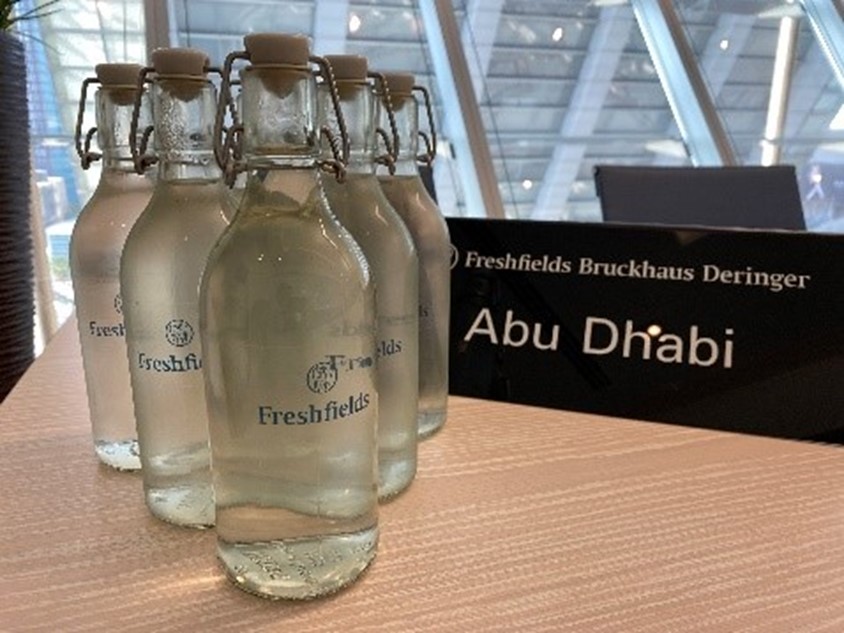
Our Manchester office colleagues in 2023 welcomed four interns from the firm's Aspiring Professionals Programme. A collective effort, driven by a shared vision of sustainability, resulted in an engaging and enlightening experience that left a lasting impact. The interns took the reins in an impactful ‘lunch and learn’ session, focusing on Plastic Free July and the 'Sort it Out' waste challenge, which showcases waste segregation analysis. The interns introduced the history and challenges of Plastic Free July, building awareness about plastic’s impact on the environment. Through engaging discussions, colleagues were encouraged to reconsider their use of plastic, how it is disposed of, and the consequences, culminating in a 'Sort it Out' waste challenge.
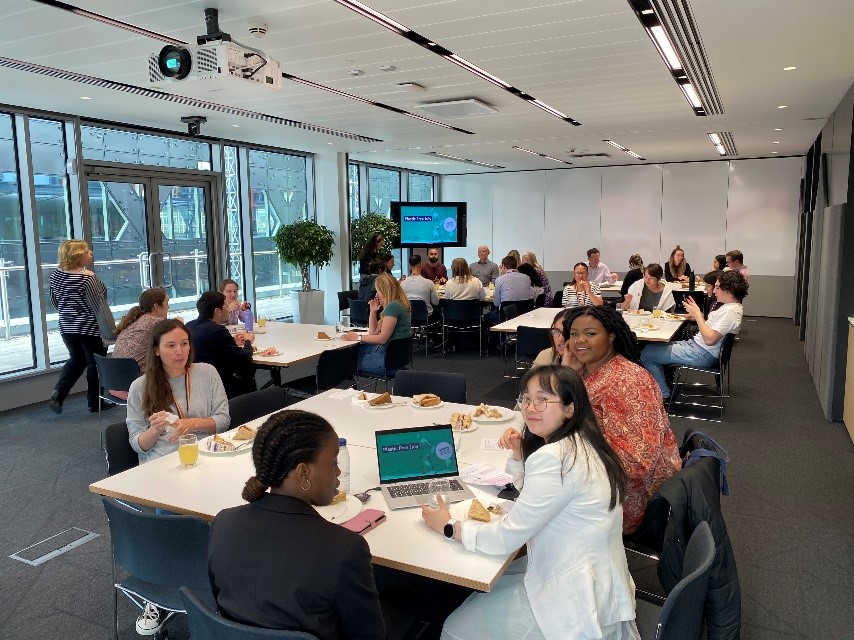
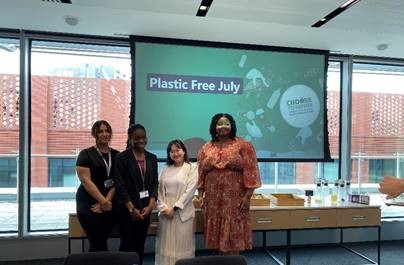
London: a city of change
Our London office, the largest in our global network, embraced Plastic Free July in 2023 with communication campaigns and strategic operational changes, reducing single-use plastics in its catering operations to an all-time low through discounts for reusable cups and the removal of disposable containers. In tandem our London Environment Manager conducted a plastic waste audit to gain insight into where plastic is originating, and options for eliminating it from procurement. Our London office has also entered the Clean City Awards Scheme which among other ambitions seeks to make the City of London a Plastic Free City.
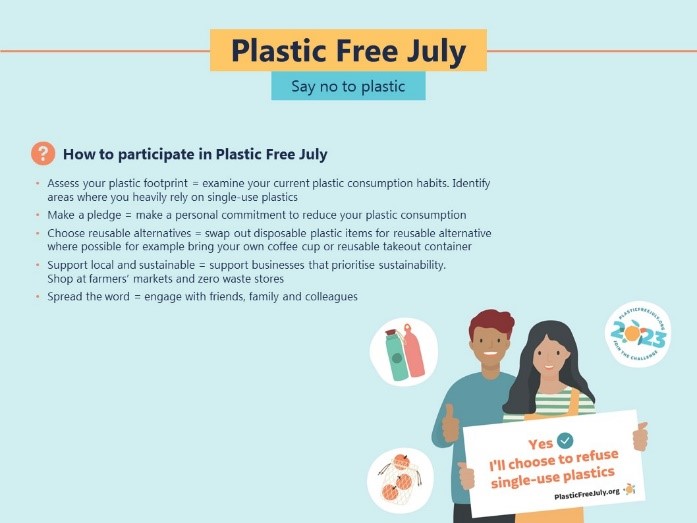
Passionate colleagues across our offices continue to be instrumental in driving down our use of plastics. Whilst we have not phased out plastics altogether, the lessons we are learning across the network are building the insights necessary to do so in future.
Freshfields’ environmental commitments are led by Dr Jake Reynolds, Head of Client Sustainability and Environment, supported by Global Environment Manager, Mikey Bloxham, the Global Green Group, with oversight from our Environmental Delivery Group (EDG).
The environment section of our website has more about our environmental commitments and our sustainability blog has our latest sustainability insights.
